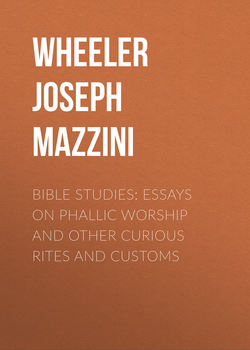Bible Studies: Essays on Phallic Worship and Other Curious Rites and Customs

Реклама. ООО «ЛитРес», ИНН: 7719571260.
Оглавление
Wheeler Joseph Mazzini. Bible Studies: Essays on Phallic Worship and Other Curious Rites and Customs
PREFACE
PHALLIC WORSHIP AMONG THE JEWS
CIRCUMCISION
MOSES AT THE INN
THE BRAZEN SERPENT, AND SALVATION BY SIMILARS
RELIGION AND MAGIC
TABOOS
BLOOD RITES
SCAPEGOATS
A BIBLE BARBARITY
BIBLE WITCHCRAFT
SAUL'S SPIRITUALIST STANCE AT ENDOR
SACRIFICES
THE PASSOVER
THE EVOLUTION OF JAHVEH
JOSHUA AND THE SUN
THE HEBREW PROPHETS
OLD TESTAMENT MARRIAGE
THE SONG OF SOLOMON
SACRED SEVEN
Отрывок из книги
I am not one of those who find in phallicism the key to all the mysteries of mythology. All the striking phenomena of nature—the alternations of light and darkness, sun and moon, the terrors of the thunderstorm, and of pain, disease and death, together with his own dreams and imaginations—contributed to evoke the wonder and superstition of early man. But investigation of early religion shows it often nucleated around the phenomena of generation. The first and final problem of religion concerns the production of things. Man's own body was always nearer to him than sun, moon, and stars; and early man, thinking not in words but in things, had to express the very idea of creation or production in terms of his own body. It was so in Egypt, where the symbol, from being the sign of production, became also the sign of life, and of regeneration and resurrection. It was so in Babylonia and Assyria, as in ancient Greece and Troy, and is so till this day in India.
Montaigne says:
.....
Dr. Kalisch also says Baal Peor "was probably the principle of generation par excellence, and at his festivals virgins were accustomed to yield themselves in his honor. To this disgraceful idolatry the Hebrews were addicted from very early times; they are related to have already been smitten on account of it by a fearful plague which destroyed 24,000 worshippers, and they seem to have clung to its shameful practices in later periods."9 Jerome says plainly that Baal-Peor was Priapus, which some derive from Peor Apis. Hosea says (ix. 10, Revised Version) "they came to Baal-Peor and consecrated themselves unto the shameful thing, and became abominable like that which they loved"; see, too, Num. xxvi. 1, 3. Amos (ii. 7,8) says a son and a father go in unto the same maid in the house of God to profane Jahveh's holy name, so that it appears this "maid" was regarded as in the service of Jahveh. Maimonides says it was known that the worship of Baal-Peor was by uncovering of the nakedness; and this he makes the reason why God commanded the priests to make themselves breeches to wear at the time of service, and why they might not go up to the altar by steps that their nakedness might not be discovered.10 Jules Soury says11 "The tents of the sacred prostitutes were generally erected on the high places."
In the temple at Jerusalem the women wove hangings for the Asherah (2 Kings xxiii. 7), that is for concealment in the worship of the genetrix, and in the same precincts were the houses of prostitute priests (see also 1 Kings xiv. 24; xv. 12; xxii. 46. Luther translates "Hurer"). Although Josiah destroyed these, B.C. 624, Kalisch says "The image of Ashtarte was probably erected again in the inner court (Jer. xxxii. 34; Ezek. viii. 6)." Ezekiel says (xvi. 16), "And of thy garments thou didst take, and deckedst thy high places with divers colors and playedst the harlot thereupon," and (v. 24) "Thou hast also built unto thee an eminent place, and hast made thee a high place in every street," which is plainly translated in the Roman Catholic Douay version "Thou didst also build thee a common stew and madest thee a brothel house in every street." The "strange woman," against whom the Proverbs warns, practised her profession under cover of religion (see Prov. vii. 14). The "peace offerings" there alluded to were religious sacrifices.
.....